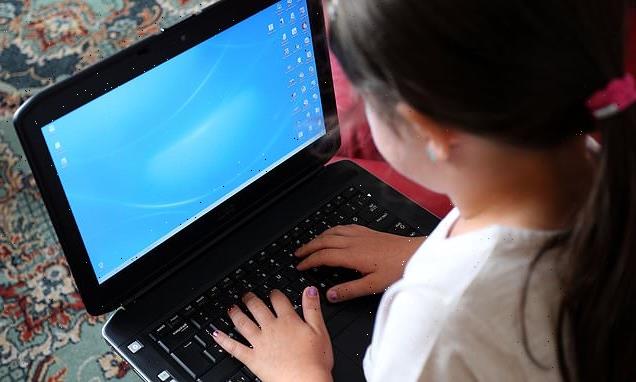‘This is a social and digital emergency’: Data shows number of children aged seven to 10 who have posted nude images online has surged by 360%
- The Internet Watch Foundation (IWF) found a 360% increase from 2020
- It discovered 19,760 indecent images of children aged seven to ten
- Adults or older children coerce them into stripping or indecent acts
- The clips are filmed on video internet chat sites and shared online
Parents have been warned of a huge rise in the number of primary school children being coerced into posting nude and sexual images online.
The Internet Watch Foundation found 19,760 ‘self-generated’ indecent images featuring children aged seven to ten during the first six months of this year.
It represented a 360 per cent increase on the same period in 2020. The charity said the rise was a ‘social and digital emergency’.
The images are usually filmed on video internet chat sites, with adults or older children coercing youngsters into stripping or performing indecent acts.
The clips are then shared online.
In some cases children are blackmailed into producing ever-more explicit images.
The Internet Watch Foundation found 19,760 ‘self-generated’ indecent images featuring children aged seven to ten during the first six months of this year. It represented a 360 per cent increase on the same period in 2020. Pictured: file image of a child on a computer
Susie Hargreaves of the IWF said: ‘There is no place for child sexual abuse on the internet and we cannot simply accept, year on year, that sexual imagery of children is allowed to be exchanged without constraint online.
‘Children are not to blame. They are often being coerced, tricked or pressured by sexual abusers.’
The largest number of indecent images identified by the IWF was from the 11 to 13 age group.
In the first six months of this year, the organisation identified more than 56,000 postings of children in that age group, up 107 per cent on the same period in 2020.
The IWF monitors the web for child abuse images and compiles a list of pages which can then be blocked by internet providers and other tech firms.
Miss Hargreaves said: ‘We need to attack this criminality from several directions, including providing parents and carers with support to have positive discussions around technology use and sexual abuse.’
Dennis’s mobile alert
He has caused chaos and mayhem since he first graced Beano’s pages in 1951.
But now Dennis the Menace, left, is teaching children about the internet’s dangers.
In a special edition of the comic, the schoolboy gets a mobile phone but is unaware of the dangers online.
Among his errors, he downloads inappropriate apps, makes prank calls and even uploads a video of his cousin Minnie the Minx without her consent.
Source: Read Full Article

